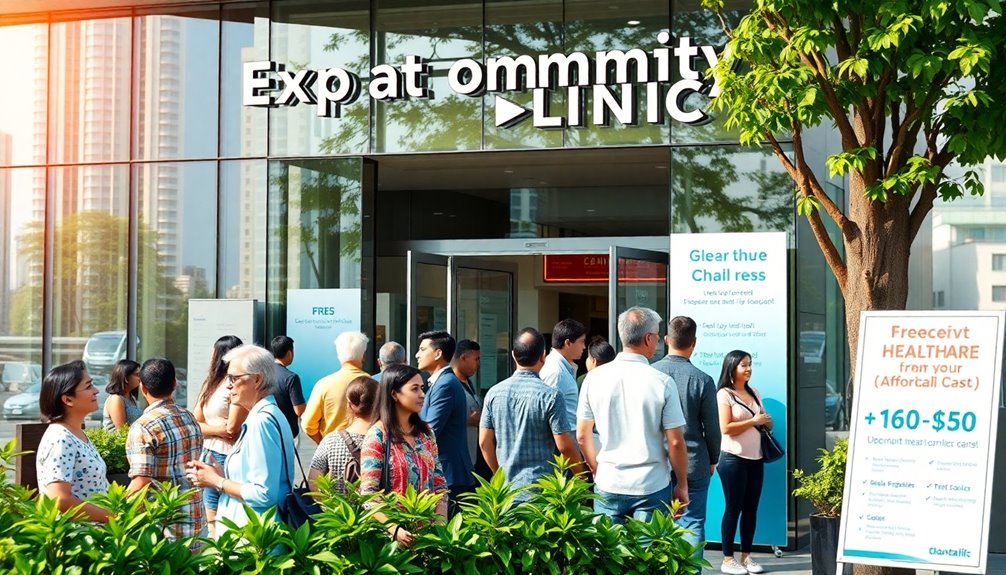When you're choosing an expat location, access to quality healthcare should be a top priority. Look for countries with a mix of public and private facilities, like Spain or Germany, where you can find advanced medical services and shorter wait times. Consider the availability of health insurance options that fit your needs; some places mandate coverage for residency. Costs vary widely, so evaluate both premiums and out-of-pocket expenses. Understanding these factors can help guarantee you receive the care you need. Keep exploring to uncover more insights on making the best choice for your healthcare in a new country.
Key Takeaways
- Evaluate the availability and proximity of healthcare facilities, ensuring timely access to care in your chosen expat location.
- Consider the quality of care, including advanced medical technology and well-trained staff, available in the region.
- Research health insurance options, including public and private coverage, to ensure adequate protection for unexpected health issues.
- Assess the cost and affordability of healthcare services, including premiums, deductibles, and out-of-pocket expenses in your destination.
- Understand local legal and regulatory factors regarding health insurance requirements and compliance with local healthcare systems.
Accessibility of Healthcare Services

Finding your way through healthcare access as an expat can feel intimidating, but understanding the landscape of services can make it easier. Many countries, like Mexico and Thailand, offer a blend of public and private hospitals. You'll likely find that private facilities are more advanced and preferred by expats.
If you're in Germany, you'll benefit from a high density of hospitals and doctors, ensuring ample access to care. In urban areas of countries like Spain, healthcare facilities are modern and well-maintained, providing better access where most expats reside. Plus, specialized medical centers in places like Singapore and New Zealand cater specifically to various healthcare needs, enhancing your options. Language shouldn't be a barrier either; many countries, such as Mexico and Thailand, boast English-speaking medical staff.
In Spain, you'll find professionals fluent in English, especially in expat-populated regions. Additionally, some healthcare systems offer interpreters and multilingual literature, helping you communicate effectively. Furthermore, understanding local healthcare regulations can improve access to services, ensuring you can navigate the system with ease.
With this knowledge, steering through healthcare access becomes much less overwhelming as you settle into your new home.
Quality of Care

As you navigate healthcare access as an expat, the quality of care you receive is a top priority. Countries like Singapore and Germany stand out with advanced medical facilities and state-of-the-art technology that guarantee effective treatment.
In the Netherlands, you'll find modern medical advancements enhancing healthcare, while private facilities in Mexico are equipped with the latest technology, making them a popular choice for expats. The qualifications and proficiency of medical professionals also play an essential role. In Australia and Spain, highly trained medical staff uphold high healthcare standards.
Similarly, many doctors in Colombia have gained experience abroad, providing care that rivals what you'd expect in the US. Access to specialist services is important, too. Germany offers a robust system with readily available specialists, while the Netherlands uses general practitioners to efficiently guide you to specialized care.
In Colombia and Spain, you can find hospitals with English-speaking staff and thorough service options. Lastly, preventive and emergency care shouldn't be overlooked. Countries like Australia and Singapore focus on preventive measures, guaranteeing you get timely treatment when needed. Notably, countries like Costa Rica and Portugal provide affordable healthcare options, ensuring that expats can access quality care without financial stress.
With these factors in mind, you can make an informed decision about where to live as an expat.
Health Insurance Options

Steering through health insurance options as an expat can feel overwhelming, but a variety of plans exist to meet your specific needs. Understanding your choices is essential for ensuring you have adequate coverage while living abroad.
Here are some key options to reflect on:
- Modular Plans: Cigna Global Medical offers modular designs, allowing you to tailor your policy to fit your budget and requirements.
- Flexible Deductibles: With the GeoBlue Xplorer plan, you can define your deductible and prescription benefits to suit your personal needs.
- Multiple Choices: IMG Global Medical Insurance provides four different plan options, along with additional coverages for thorough protection.
- Supplemental Coverage: Cigna Health Insurance gives you the option to choose supplemental coverage for a more customized health plan.
When selecting a plan, think about factors like cost, coverage for pre-existing conditions, and whether you need additional benefits, such as dental or vision care. Additionally, it's important to remember that U.S. health insurance typically does not cover overseas medical costs, making private health insurance recommended for Americans abroad.
Geographic Coverage

When considering your health insurance options as an expat, it's important to understand how geographic coverage plays an essential role in your access to healthcare. Having a global network of providers means you can receive care from trusted healthcare professionals, no matter where you are.
International health insurance plans typically cover over 200 countries and territories, guaranteeing you have access to quality medical care regardless of your location. Countries like Spain, Portugal, and Costa Rica offer universal healthcare systems that provide free or subsidized services. This can be particularly beneficial for expats seeking affordable care.
On the other hand, nations like Singapore and Germany boast high-quality healthcare environments backed by robust infrastructures. Additionally, it's crucial to review coverage limits for pre-existing conditions, as this can affect your access to necessary services abroad.
You'll also find that many healthcare providers in these countries are fluent in English, making it easier for non-native speakers to navigate the system. Whether you're visiting a public or private facility, understanding the geographic coverage of your health insurance can greatly impact your healthcare experience abroad.
Always verify your policy includes coverage in the regions you plan to reside in, as this will enhance your peace of mind while living overseas.
Cost and Affordability

When it comes to healthcare, understanding premiums and deductibles is vital for expats like you. You'll want to explore budget-friendly options that still provide essential coverage without breaking the bank. Knowing your costs upfront can help you make informed decisions about your healthcare needs abroad. For instance, in the United States, the average consultation cost with a general practitioner is around $190, highlighting the importance of securing comprehensive international health insurance to manage unexpected medical expenses.
Premiums and Deductibles
Maneuvering the complexities of premiums and deductibles is essential for expatriates seeking affordable healthcare. Understanding how these costs impact your budget can make a significant difference in your overall experience abroad. Here are some key points to take into account:
- Premium Costs: Your age and location play a significant role in determining premiums. For instance, annual premiums can range from $3,594 in Thailand to $9,817 in the U.S. Additionally, many plans offer worldwide coverage that includes comprehensive benefits for private medical insurance.
- Deductible Variance: Deductibles can range from $0 to $25,000, affecting your monthly premiums. Higher deductibles typically lead to lower premiums, but the trade-off isn't always straightforward.
- Family Discounts: If you have a family, look for plans that offer discounts for families with three or more children, which can help reduce overall costs.
- Service Deductibles: Not all services require a deductible. Preventative care, office visits, and some prescriptions may have no deductible or separate deductibles.
Budget-Friendly Options
Finding budget-friendly healthcare options is essential for expats looking to manage their expenses effectively while living abroad. Many countries offer universal healthcare systems with little to no out-of-pocket costs.
For instance, both Spain and Greece provide thorough public healthcare, covering pre-existing conditions and minimizing your expenses. Portugal caps annual service fees at $1,100, which can be deducted from your taxes, making it an attractive option.
If you prefer private healthcare, options like Costa Rica and Panama allow for flexible plans. In Costa Rica, expats often choose private services for shorter wait times and better facilities. Universal healthcare systems in countries like Finland also ensure that emergency care is provided free of charge, enhancing overall affordability.
Panama offers discounts for retirees with a pensionado visa, making healthcare even more affordable.
When considering expenses, check out-of-pocket costs in countries like France and Colombia, where emergency visits can be quite reasonable.
Ultimately, evaluating both public and private healthcare options will help you strike a balance between cost and care quality.
Additional Benefits and Services

Expats can take advantage of a range of additional benefits and services that enhance their healthcare experience abroad. These perks not only provide peace of mind but also guarantee thorough care when you need it most.
Here are some key offerings to look for:
- Thorough Medical Coverage: Enjoy inpatient and outpatient care, including surgeries, diagnostics, and mental health treatments, along with maternity and newborn care.
- Emergency and Evacuation Services: Access emergency medical evacuation to top facilities if local options fall short, and benefit from 24/7 hotlines for immediate assistance.
- Global Provider Networks and Direct Pay: Leverage extensive healthcare networks with direct billing options that minimize out-of-pocket expenses, allowing you to focus on your health rather than finances.
- Additional Health and Wellness Benefits: Take advantage of preventive care, unlimited telemedicine services, and even alternative treatments like acupuncture, guaranteeing you stay well-rounded in your healthcare approach. Additionally, many plans also offer comprehensive expatriate medical insurance that covers a wide range of services, ensuring that you are well-protected in case of unexpected health issues.
These additional services can greatly improve your healthcare experience, making your expat life healthier and more manageable.
Choosing the Right Location

When you're choosing the right location for healthcare as an expat, consider the availability of medical facilities and how efficiently emergency services operate.
You'll also want to explore health insurance options in that area, as they can greatly impact your access to care. Countries like Germany, Japan, and Switzerland prioritize preventive care, which can enhance your overall health outcomes.
Making informed decisions now can save you time, money, and stress later on.
Availability of Facilities
How do you choose the right location for healthcare access as an expatriate? The availability of facilities is essential in ensuring you receive timely and quality healthcare. Here are some factors to take into account:
- Public vs. Private: Weigh the benefits of public healthcare systems like those in Spain and Sweden, which offer low costs, against private options that often provide shorter wait times and English-speaking staff in places like Mexico and Dubai. In fact, many expats prefer private hospitals due to their higher quality of care and advanced medical technology.
- Distribution of Facilities: Check the accessibility of hospitals and clinics in your chosen location. For instance, Singapore boasts a well-distributed network, making high-quality medical services easily accessible.
- Recommendations: Utilize your expat community for recommendations on local doctors and hospitals. This can be particularly beneficial in countries like Mexico, where personal referrals can help you find the best care.
- Technology and Comfort: Look for modern hospitals equipped with the latest technology. Countries like Singapore and Germany are known for their state-of-the-art facilities, which enhance the quality of treatment you receive.
Emergency Services Efficiency
Selecting a location for your healthcare access means not just reflecting on the availability of facilities but also the efficiency of emergency services. You should be aware of the emergency numbers specific to your city, as they can differ across countries.
It's beneficial to choose places like Spain, where 24-hour emergency services are standard, guaranteeing help is always available. Look for countries such as Singapore, known for their quick and reliable ambulance services, which can make a fundamental difference in emergencies. In Spain, ambulance services are free for residents and expats in emergencies, providing an added layer of reassurance.
Streamlined emergency hospital admission processes are also essential, allowing you to receive prompt medical attention when needed. Being prepared by understanding local health protocols and vaccination requirements can greatly improve your emergency experience.
Language support is another factor to take into account. Many hospitals in expatriate-friendly regions have English-speaking staff or translation services, helping you navigate any language barriers during medical emergencies.
Countries like Mexico provide access to multilingual medical professionals, enhancing communication. Ultimately, evaluating the quality, efficiency, and accessibility of emergency services in your potential expat location will guarantee that you can receive the care you need when it matters most.
Health Insurance Options
Steering through health insurance options is essential for expats looking to secure their healthcare needs in a new country. As you evaluate your options, consider the following key factors:
- Coverage Scope: Confirm the plan covers doctor's consultations, hospitalization, and prescription medications. Some plans also include maternity and dental care, which could be important for your family.
- Provider Network: Look for plans with a global network of healthcare providers. Access to local hospitals and specialists guarantees you receive timely care, wherever you are. Additionally, many plans provide comprehensive coverage for international healthcare needs, which is crucial for expats.
- Customization: Choose a plan that allows you to tailor coverage to your specific needs. Options for deductibles, prescription benefits, and additional coverages can help match your budget and healthcare requirements.
- Affordability: Monthly premiums vary widely, so find a plan that fits your financial situation. Consider the costs for including family members and weigh them against the benefits offered.
Frequently Asked Questions
How Do Cultural Attitudes Affect Healthcare Experiences for Expats?
Cultural attitudes greatly shape your healthcare experiences as an expat.
You might face challenges in communication and understanding due to differing beliefs about health and treatment. These cultural nuances can lead to mistrust between you and healthcare providers, impacting your satisfaction and adherence to medical advice.
If you encounter language barriers, it could further complicate your care, making it essential to choose providers who respect and understand your cultural background.
What Languages Are Commonly Spoken in Local Healthcare Facilities?
Have you ever wondered what languages you'll encounter in local healthcare facilities?
In many expat-friendly countries, English is commonly spoken, especially in private hospitals and areas with high expat populations.
Spanish is prevalent in Spain, while Singapore boasts a multilingual environment.
In Panama, you'll find English spoken more frequently among private practitioners.
It's crucial to take into account language when choosing healthcare, as it can greatly influence your experience and comfort during medical visits.
Are There Specific Health Risks to Consider in Different Countries?
When considering health risks in different countries, you should be aware of infectious diseases like Hepatitis A and malaria, common in specific regions.
Contaminated water can lead to cholera and typhoid, while poor food hygiene heightens risks too.
Natural disasters and climate-related diseases can impact health, particularly in urban areas with high crime rates and limited access to quality healthcare.
Always research these factors before moving to guarantee your well-being.
How Do Local Customs Influence Patient-Provider Interactions?
Imagine walking into a bustling market where every smile tells a story.
Local customs shape how you interact with healthcare providers; they dictate everything from greetings to discussions about ailments.
You'll find that family often plays a starring role in decisions, while traditional beliefs can add layers of complexity.
If you don't respect these nuances, you might miss crucial information or create misunderstandings.
Understanding cultural cues is your golden ticket to effective communication.
What Resources Are Available for Expats Facing Healthcare Challenges?
When you face healthcare challenges as an expat, several resources can help.
First, connect with local expat communities for recommendations and support.
Utilize online platforms for accessing healthcare reviews and information.
You might also find assistance through international health insurance providers, offering tailored plans.
Don't forget to check with your employer for any health benefits.
Finally, local embassies often provide resource lists that can guide you in steering through healthcare services in your area.
Conclusion
When choosing your expat location, healthcare access should be a top priority. Imagine relocating to Portugal, where you find excellent public healthcare and a range of private insurance options that fit your budget. By prioritizing accessibility, quality of care, and affordability, you'll guarantee peace of mind for you and your family. After all, being in good health is essential for enjoying your new adventure abroad. Make informed choices, and you'll thrive in your new home.








